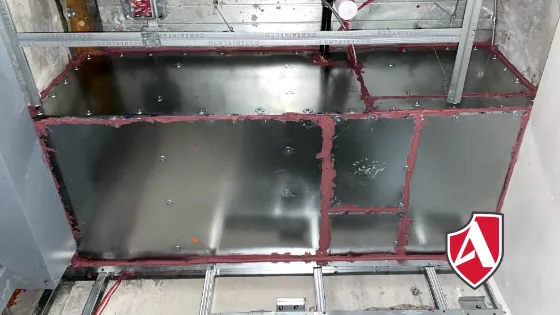If you're a General Contractor responsible for the construction of a multi-family or mixed-use commercial facility and you're looking for reliable fire stopping contractors, you've come to the right place! Passive fire protection has become much more than delegating M.E.P. trades to self-perform the fire caulking; It has become an increasingly important scope of work that requires technical knowledge of approved UL assemblies, certified firestop installers, and a thorough understanding of what inspectors are looking for.
In this blog post, you'll learn:
- How fire stopping works
- Benefits of working with certified fire stopping contractors
- What you should know about Engineering Judgements
- What should you do now?
Titan Applicators LLC is a certified firestop installer that has been servicing the greater Denver area for nearly a decade. All of the information you will find on our website has been written and produced in-house and is based off of real-world experiences.
Every Construction Superintendent In Colorado Needs to Read This
How Fire Stopping Works
If you're actively looking for a certified fire stop contractor, you probably already know why a building needs commercial fire stopping. For those of of you who aren't completely would like more information, read this: Commercial Firestop Services. Regardless, here's the real basic and elementary version of how fire stopping works. Commercial buildings, such as multi-family residential new builds, are made up a bunch of different assemblies. - Think walls, floors, ceilings, roofs. - Many of these assemblies have a special fire rating. Typically, these fire rated assemblies separate some combination levels, living units, or paths of egress.
During the construction process, and throughout the life of the building, penetrations (holes) are made partially through or completely through these fire rated assemblies by other trades. - Think wires, cables, pipes, HVAC ducts, and other things necessary for the building. - These M.E.P. penetrations ruin the original fire rated integrity of the assembly and allow the passage of smoke, fire, and gases to flow freely to other areas of the building in the event of a fire.
As a result, there are testing standards that have been developed by ASTM (American Society for Tested Material) and UL (Underwriters Laboratories) for through-penetration firestopping systems. These standards have been adopted and enforced by building codes as the proper method of restoring the fire-rating of a consturction assembly.

Tested Fire-stopping Systems Consist of:
- Sealants
- Wrap-strips
- Collars
- Pass-Through Devices
- Cast-In-Place Devices
- Putty Pads
- Endothermic Wraps
- Backing
- Intumescent Blocks/Pillows
Fire Stopping Contractors Near Me: Not All Search Results Are Equal
As the general contractor of a large commercial construction project, such as multi-family residential buildings, it is in your best interest to hire an experienced and certified fire stop contractor. So, before you pull up Google and search "fire stopping contractors near me," it would be prudent of you to know what qualifies a fire stopping contractor. As the famous James Baker quote astutely explains, "Prior preparation prevents poor performance."
5 Ways A Certified Firestop Installer Can Add Value To Your Project:
- Limits Unnecessary Schedule Delays - Any experienced commercial firestopping contractor knows that schedule delays occur before they even arrive on site. How is that possible? Well, as previously stated, each and every penetration must match a Tested Listed System. An inspector will fail a framing and fire stop inspection due to a firestopping issue when one aspect of the application deviates from the referenced design. It is our experience that the most common issue is specified annular space, or the allowable distance from the inside edge of the opening to the outside edge of the penetrating item. This space is critical to the performance of the tested firestop system and can tremendously slow the pace of a firestop installer if it becomes a reoccurring problem. An experienced firestop contractor will communicate with the other trades as rough-ins begin to ensure proper holes are being cut according to tested systems.
- Quality Control - You get what you pay for and the results in quality on a project which adopts the protocol of "You poke it, you fill it" are about as ugly and as the name. Investing in a professional fire stop contractor, with QC processes and systems designs for in-field installations, means installations are done right and the same with each and every respective penetration. This builds confidence with inspectors and looks clean to owners and owners' representative as the walk the building.
- Documentation - Obviously, meeting construction schedules is important to everyone on the job site. But, a professional fire stopping contractor should have the GC's back! At Titan Applicators, we use a powerful tool that speaks to all team members involved, in real time. It allows us to document, track, and manage each and every firestop item from phones, tablets, or desktop computers. The program allows us to upload floor drawings and pinpoint firestop locations to streamline the entire fire stopping process. That is important for multiple reasons: a) it facilitates collaboration between trades, making sure corrections are completed prior to frame inspection, b) it attaches relevant UL systems for a basis of design, allowing us to provide documentation to inspectors in seconds, c) it provides life saving information for future facilities management teams to reference as they make changes to the building, and d) it becomes a powerful tool to decrease liabilities for everyone involved.
- Knowledge - As firestopping code has evolved so have the methods by which it is accomplished. As a result, there are multiple materials and techniques used in many systems. Having an experienced fire stop contractor with the knowledge of all of those materials and the proper installation techniques is critical to a smooth and efficient construction schedule. No two commercial construction projects are exactly alike and there will always be a fire stop "curveball" thrown your way. An experienced contractor will have the tools, resources, and confidence to quickly diffuse a potentially stressful situation and keep the job moving.
- Technical Support - There will always be unfamiliar situations that present themselves. As as result, it is important that a firestopping contractor has the support of a technical and engineering team which provides the highest quality, fully tested, and innovative firestopping solutions. Titan Applicators has partnered with the industries top firestop manufacturers to provide Colorado with the best service possible.
The Low-Down On Firestop Engineering Judgements
Engineering Judgements, commonly referred to as an "EJ", are the result of unavoidable job site conditions that do not have a tested and listed design on how to be properly fire stopped. EJs are much more common than one would think due to main factors: 1) the fast-paced and somewhat unorganized environment of a commercial construction site, and 2) the increasing level of education that inspectors have of proper firestop installation.
Many times, we anticipate large commercial construction projects to produce at least one situation which requires an Engineering Judgement. Nonetheless, upfront planning during the pre-construction process can greatly reduce the likelihood of getting the firestop engineers involved. The upfront planning should involve the architect, general contractor, and the respective individual trades. Multiple pre-construction meetings, coordination meetings, and a comprehensive mental walk through of the entire building process may reveal firestop deviations before they actually happen.

How Reliable are EJs?
In the event that you need an Engineering Judgement, the experience of your certified firestop contractor is of the utmost importance. Nearly all EJs are created based on the actual conditions in the field. If a contractor conveys bad or incorrect information then the result will be a bad or incorrect EJ; at no fault of the firestopping engineer! There is a huge difference in the experience of a firestopper with 1 year of experience versus a firestopper with 10 years of experience.
Another factor that determines the reliability of a firestop EJ is the amount of test data that a manufacturer has to back-up the EJ. The greater number of approved systems they have translates to a higher probability that the EJ will work.
Regardless of what you're calling them, EJs have become a critical part of the commercial construction process. The key is to partner with an experienced contractor that has, in turn, also partnered with a reputable and reliable firestop manufacturer.







